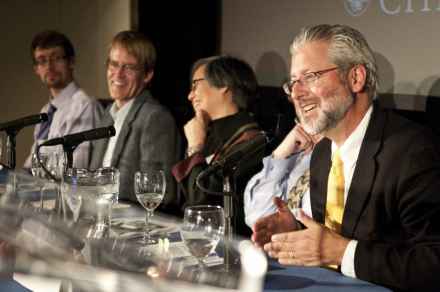Tom Gunning Illustrates Small Details on the Big Screen
Monday night screenings, shot-for-shot dissections, and lively discussion are all par for the course during film classes with Tom Gunning, the Edwin A. and Betty L. Bergman Distinguished Service Professor of Art History and Cinema and Media Studies. The University of Chicago Magazine profiled Gunning, highlighting his "History of International Cinema, Part II: Sound Era to 1960" course. Throughout the class, he offers nuanced readings of films such as M, a 1931 police procedural by Fritz Lang, and It Happened One Night, a genre-defining romantic comedy starring Clark Gable and Claudette Colbert. The small cinematic details Gunning fixates on are writ large by viewing the films on the big screen.
Pick up What Is Cinema?, the text Gunning uses when teaching "History of International Cinema, Part II".
Read a Tableau interview with Tom Gunning here.
